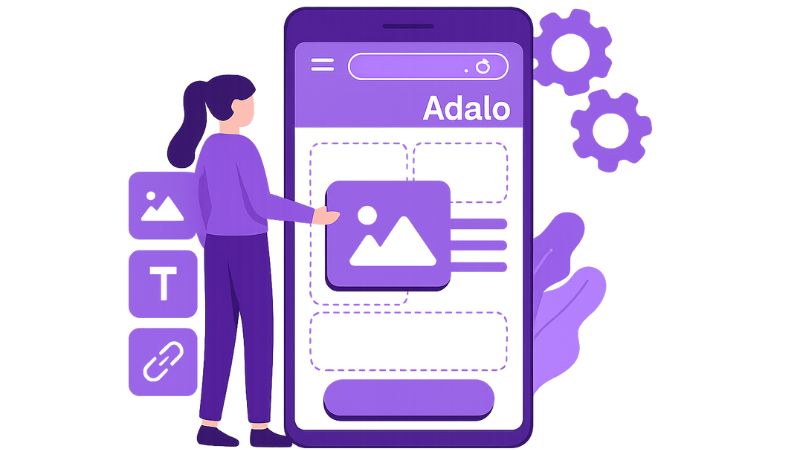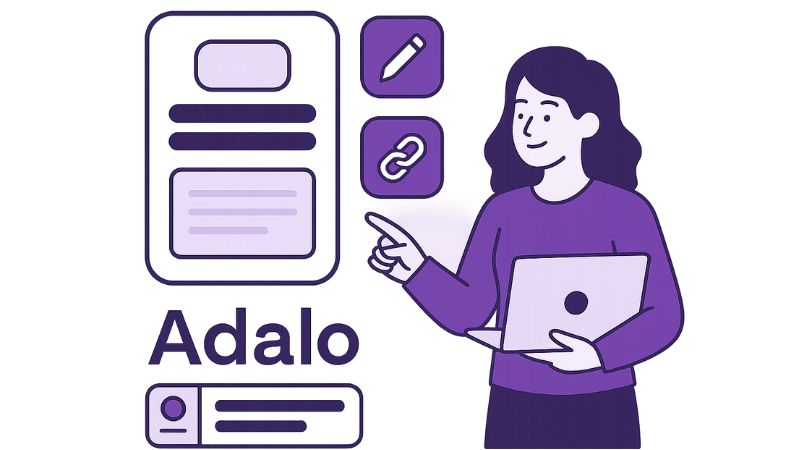Adalo
Adalo: a no-code tool for creating mobile applications!
In today’s fast-moving digital world, businesses are constantly looking for faster and more affordable ways to build professional-grade applications. Hiring developers can be costly and time-consuming — that’s where Adalo, a powerful no-code platform for building mobile and web apps, steps in.
With Adalo, even non-technical users can design, develop, and deploy apps without writing a single line of code. Whether you need a mobile app for customers, an internal business tool, or a web dashboard for management, Adalo makes it possible to bring your idea to life with an intuitive drag-and-drop interface.

What is the Adalo platform?
Adalo is a no-code app development platform that allows users to create, design, and publish mobile and web applications quickly and easily. Founded in 2018, the platform has since gained massive popularity among startups, freelancers, and businesses that need to create apps but lack advanced programming knowledge.
Named after Ada Lovelace — recognized as the world’s first computer programmer — Adalo empowers creators to turn their ideas into functional, interactive applications. You can easily publish your app to iOS and Android app stores directly from Adalo’s platform, without complex build processes or lengthy approvals.
Its visual interface and pre-built templates make app creation smooth and accessible to everyone whether you’re a designer, entrepreneur, or part of a marketing team.

Why mobile and web apps matter more than ever
Since the pandemic, businesses around the world have realized the importance of digital tools to stay connected with customers and streamline operations. Mobile and web applications have become essential for brand visibility, engagement, and automation.
From e-commerce stores and booking systems to internal dashboards and customer portals every industry is embracing app solutions to improve workflow efficiency. Adalo plays a critical role in this shift by helping small and mid-sized businesses build custom apps affordably.
With Adalo, even small teams can deploy fully functional apps that run on both iOS and Android, empowering businesses to compete digitally without major development costs.
Main features of Adalo
Adalo comes packed with tools that allow anyone to design a professional, feature-rich app. Here are some of its most important features:
- Application Integrations: Connect with third-party services like Zapier, Xano, Stripe, or Airtable for payments, automation, and data management.
- Access Control: Define user roles and permissions to manage who can access certain app sections or features.
- Integration Management: Seamlessly integrate APIs and connect external databases without manual coding.
- Workflow Management: Automate key processes — from form submissions to data updates — using visual workflows.
- Version Control: Save multiple versions of your app and roll back changes safely.
- Web Development: Build web-based dashboards and interfaces with the same ease as mobile applications.
- Testing and Debugging: Preview and test your app in real time to ensure proper functionality before publishing.
- App Templates: Choose from ready-made templates for e-commerce, education, fitness, and service apps to jumpstart your design.
- Custom Branding: Adjust colors, icons, and typography to align with your brand identity.
Adalo vs Bubble
Both Adalo and Bubble are popular names in the no-code ecosystem, but each serves slightly different purposes.
- Adalo focuses primarily on mobile app creation, enabling users to publish directly to Google Play and the App Store. It’s ideal for startups, freelancers, and small businesses wanting to create apps with beautiful interfaces and responsive functionality.
- Bubble, on the other hand, is designed for web applications and offers more backend flexibility and database customization.
If you’re building a mobile-first product, Adalo is a perfect choice. It gives you native app support, real-time testing, and visual workflow automation, making the development experience fast, modern, and intuitive.
dvantages of using Adalo
- No coding required: Anyone can create a functional mobile or web app without programming experience.
- Native mobile publishing: Directly publish your app to iOS and Android stores.
- Drag-and-drop simplicity: Quickly design visually appealing layouts.
- Integration flexibility: Works seamlessly with popular databases, APIs, and tools.
- Affordable pricing: Offers competitive pricing plans for startups and small businesses.
- Community support: A growing ecosystem of users, tutorials, and resources for beginners and advanced users alike.
Limitations of Adalo
- Backend limits: Adalo’s built-in database is powerful but less customizable than dedicated backend tools.
- Scalability: Apps built on Adalo may require migration to custom platforms once the business scales significantly.
- Performance: Large datasets or complex logic may lead to slower performance compared to traditional coded apps.
Adalo Pricing Plans
Adalo offers a range of pricing options suitable for different business sizes and needs:
- Free Plan – Includes essential features for learning and testing apps but with limited database and publishing access.
- Starter Plan ($36/month) – Adds custom branding, analytics, and access to additional app templates.
- Professional Plan ($52/month) – Includes publishing to app stores and integrations with external APIs.
- Team Plan ($160/month) – Designed for teams with shared editing, advanced collaboration, and dedicated support.
- Business Plan (Custom pricing) – Tailored for enterprises needing scalability, private databases, and premium support.
Conclusion
Adalo stands as one of the most accessible and complete no-code platforms for mobile and web app creation. Its strength lies in simplicity, native app publishing, and flexible integrations, making it ideal for entrepreneurs, educators, and startups looking to digitize their ideas without hiring developers.
Whether you want to build a delivery app, booking system, learning platform, or client portal Adalo empowers you to bring your vision to life with speed and confidence.
In short, Adalo bridges the gap between creativity and technology helping anyone design mobile and web experiences that are functional, beautiful, and ready to scale.
The No Code tools we use
Let's talk about your application, AI agent or automation.
Frequently asked questions about
We help you build businesses that are human, sustainable and much more efficient.
Yes. Adalo connects with platforms like Zapier, Xano, Airtable, and Stripe, plus custom APIs for automation and payments.
Yes. Adalo uses encrypted hosting and secure connections, but users should also follow best security practices.
Absolutely. You can add payment gateways, subscriptions, or in-app purchases using Stripe or other integrations.
Adalo is ideal for MVPs and small-to-medium apps. For large-scale apps, connecting a stronger backend like Xano is recommended.
Yes. With Team or Business plans, multiple users can work together and manage roles within the same project.



